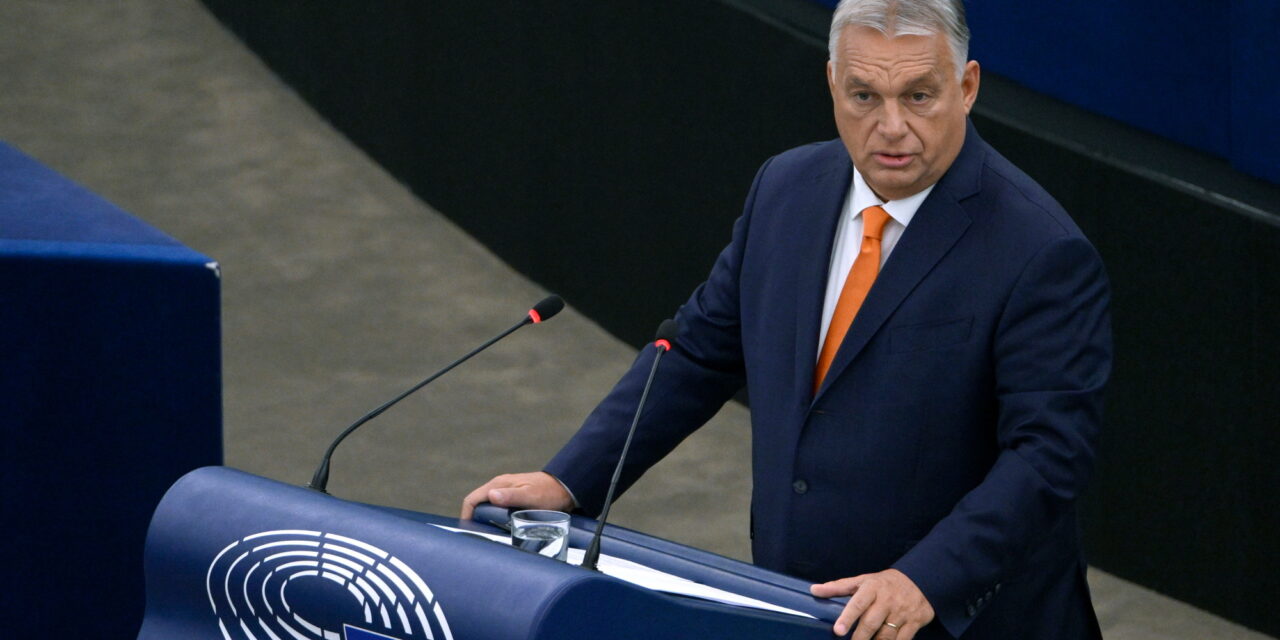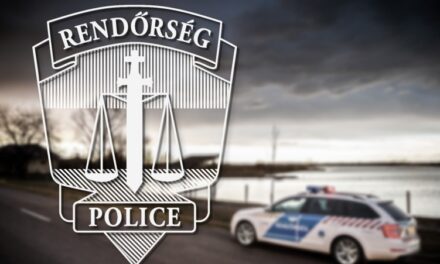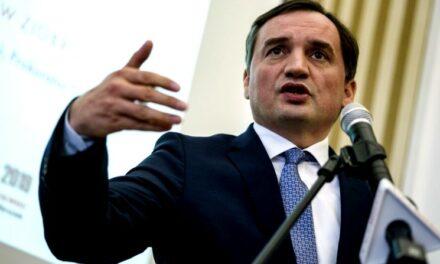The Prime Minister recalled that after 2011, Hungary holds the presidency of the Council of the European Union for the second time. He added: he is personally performing this task for the second time.
"I have been a member of parliament for thirty-four years, so I know it is an honor that you are listening to me now. It is always an honor to speak in front of parliamentarians as prime minister," he said.
He recalled: in 2011, during the first Hungarian presidency, Europe also struggled with crises, the consequences of the financial crisis, the Arab Spring and the Fukushima disaster had to be dealt with.
He said that back then they promised a stronger Europe and fulfilled what they had promised; the first European-level Roma strategy and the Danube strategy were adopted. The economic policy coordination process called the European Semester was launched under the Hungarian presidency, which was really what it was called at the time, he added.
He pointed out that the last time the EU successfully concluded an accession process, that of Croatia, was during the first Hungarian presidency.
According to his assessment, the presidency at that time was not easy either, but the job is much more difficult today, because the situation of the union is much more serious than it was in 2011, and perhaps more serious than at any time in the history of the union. Among the difficulties, he mentioned that a war is raging in Ukraine, that is, in Europe, that serious conflicts are destroying and affecting Europe in the Middle East and Africa, and that each conflict carries the risk of escalation.
He also said that the migration crisis has reached dimensions not seen since 2015, that illegal migration and security challenges threaten to disintegrate the Schengen area. Meanwhile, Europe is losing its global competitiveness, Viktor Orbán added, according to whom the Union is facing decisions that will determine its own destiny.
Speaking about the organizational and coordination work carried out so far during the Hungarian presidency, the Prime Minister indicated: so far 585 council working group meetings have been held, twenty-four ambassadorial meetings have been chaired, eight formal and 12 informal council meetings have been held, 69 presidency events have been held in Brussels and 92 in Hungary - he listed, adding that more than 10,000 guests participated in the events in Hungary.
The council's legislative work is in full swing, they are working on 52 legislative files at different levels of the council, he said.
He emphasized: the presidency is ready to start trilogue negotiations with the European Parliament at any time. At the moment, only 2-2 legislative dossiers are conducting trilogues with the parliament, but there are 41 more dossiers in which this would be necessary, and they are waiting for this to happen.
He noted: after the elections, there was a difficult institutional transition, but four months have passed and the Hungarian presidency is ready to cooperate with the parliament on the 41 files awaiting consultation.
He put it this way: "as a fair mediator, the Hungarian presidency strives for constructive cooperation with all member states and institutions, but at the same time, the Hungarian presidency will protect the powers of the council based on treaties" , such as the inter-institutional agreement between the European Parliament and the European Commission.
Speaking about the political responsibility of the Hungarian presidency, he emphasized: the European Union must change, and the Hungarian presidency wants to be the voice and catalyst of change. He identified increasing competitiveness as the most important element of the change.
He added: the Hungarian presidency raises problems and makes proposals, but decisions must be made by the member states and institutions of the union.
Regarding the problem of competitiveness, he said: the economic growth of the EU in the last two decades has been consistently slower than that of the United States and China, the productivity of the EU is growing more slowly than that of its competitors, and its share of world trade is decreasing.
In the EU, companies face two to three times higher electricity prices than in the United States, and natural gas prices are four to five times higher here, he listed.
As a result of the disengagement from Russian energy, the European Union lost significant GDP growth, and in the meantime had to reallocate significant financial resources to energy subsidies and building the infrastructure needed to import liquefied natural gas, he said.
The prime minister emphasized that half of European companies consider the cost of energy to be the main obstacle to investment, and in the case of industries that use energy intensively, production fell by 10-15 percent.
"Let's not lull ourselves into the illusion that the green transition alone offers a solution to this problem!" he said.
Even if the objectives for the installation of renewable energy sources are met, by 2030, according to all analyses, the proportion of operating hours in which fossil fuels will determine energy prices will not significantly decrease, he said.
He indicated: the basis of the European Green Agreement was to create new green jobs. However, the meaning of the initiative is questioned if decarbonization leads to a decline in European production and the loss of jobs - assessed Viktor Orbán, pointing out that the car industry is one of the most blatant examples of the lack of EU planning, where climate policy is applied without industrial policy.
The Hungarian Prime Minister reminded that the main cause of the productivity gap between the EU and the United States was digital technology.
Moreover, it seems that Europe's lagging behind continues to grow; our companies spend half as much on research and development in proportion to GDP as companies in the United States - warned Viktor Orbán.
He continued by saying that this is accompanied by unfavorable demographic processes: it can be seen from the numbers that migration does not compensate for the natural decline of the EU's population. For the first time in Europe's modern history, we are entering a period when GDP growth will not be supported by the continuous growth of the workforce, he indicated.
Referring to former Italian Prime Minister Mario Draghi and faction president Emmanuel Macron, he stated: the situation is serious and requires immediate action. We are in the 24th hour, in the technologies that are now considered pioneers, it will be decided in a few years who will be left standing, he said, adding that it is much more difficult to bring back the declining industrial capacities than to keep them.
The member states expect fast and decisive action from the European institutions in this area. They expect the reduction of administrative burdens, easing of overregulation, provision of affordable energy, green industrial policy, strengthening of the internal market, capital market union, broadening of trade policy, trade policy that increases connectivity instead of blocking, he said.
Among the successes, he mentioned - also referring to the Draghi report - the EU's dynamically developing battery industry.
He recalled: public funding for battery technology has increased by an average of 18 percent over the past decade, and this has been key in strengthening Europe's position. Today, Europe ranks third behind Japan and South Korea in patent applications for battery storage technologies, he added.
It seems that targeted and strategic intervention can be successful and beneficial for Europe, he concluded.
Viktor Orbán said: the goal of the Hungarian EU presidency is to adopt a new European competitiveness agreement at the informal meeting of the European Council in Budapest on November 8.
"I am convinced that the highest level of political commitment gives the momentum to the European competitiveness turnaround that we need," he said, suggesting that this topic be placed at the center of the action plan of the institutional cycle that is just starting.
Turning to the subject of migration, the prime minister explained: Europe has been suffering from migration pressure for years, and this places a huge burden especially on the member states located on the external borders of the EU. He stated: the external borders of the EU must be protected, this serves the interests of the Union as a whole, and therefore the EU must provide substantial support for this.
He stated: Europeans cannot be protected from illegal migration without external hotspots.
"Once we let someone in, we won't be able to send them home again. (…) There is only one solution, only those who have been given permission to enter the territory of the Union should be allowed to enter," he emphasized, calling all other solutions an illusion.
He assessed that: the EU's asylum system does not work today, illegal migration in Europe has resulted in the strengthening of anti-Semitism, violence against women and homophobia. Viktor Orbán repeated his statement amid whistling from some of the representatives in the room, adding: if you like it, if you don't, these are the facts.
He indicated: the consequence of the failed migration policy is that several member states are trying to create opportunities to be left out of the asylum system, and illegal migration and security fears have led to the permanent and extensive reinstatement of border controls.
He stated that it is time to deal with this issue at the highest political level and to discuss whether the political will necessary for the real operation of the Schengen area can be recreated, and therefore proposed the creation of a system of "Schengen summits" on behalf of the Hungarian presidency.
Viktor Orbán added: the Hungarian presidency also recommends that Bulgaria and Romania fully join the Schengen area before the end of the year.
He reminded: an important part of the EU's response to the 2008 economic crisis was the summit meeting of the leaders of the euro area, which was institutionalized in 2012 with an international agreement. The Prime Minister believes that today the Schengen area is in a similar crisis, so a similar political commitment and the institutionalization of the summit with an international treaty would be necessary.
He also spoke about the fact that, in addition to migration, Europe is also affected by many other security challenges, the summit of the European political community meeting in Budapest on November 7 - two days after the US presidential election - will be a suitable forum for discussing these.
Viktor Orbán said that today the Union is unable to guarantee its own peace and security, therefore it is necessary to institutionalize the European security and defense policy, and the Hungarian Presidency sees the best way to do this in the strengthening of the European defense industry and technological base.
He added that the Hungarian presidency is focusing on the European defense industrial strategy and plan, but the challenge is more multifaceted than that, because it also affects Member State and EU competences, and even international alliance structures.
The prime minister recommended taking Hungary's example into account. He explained that Hungary spends 2.5 percent of its gross national product on defense spending, the vast majority of the country's defense purchases come from European defense industry sources, and investments are taking place in all segments of the defense industry in Hungary with the participation of European players.
If this was possible in Hungary, it is also possible in the entire European Union, he emphasized.
Viktor Orbán spoke about the enlargement of the union as a priority topic, according to which the enlargement policy must remain merit-based, balanced and credible. He called the acceleration of the accession of the Western Balkans a key issue for European security. He said that the Balkans cannot be stabilized without the inclusion of Serbia. He added that several candidate countries fulfill the technical conditions for moving forward, but there is a lack of political consensus between the member states.
The Hungarian presidency has convened the Western Balkans-EU summit, where they want to achieve progress, he noted.
The prime minister urged the creation of competitive European agriculture and called it essential to reduce the differences in development between regions. He explained: the competitiveness of agriculture has been significantly degraded by extraordinary climatic conditions, increased costs, imports from third countries and excessive regulation, all of which threaten the security of existence of European farmers. The Hungarian presidency wants to show direction to the newly formed European Commission in order to create a competitive, crisis-resistant and farmer-friendly European agriculture, he added.
Viktor Orbán said that the cohesion policy is not a charity or a donation, it is actually the EU's largest investment policy and a condition for the balanced operation of the internal market, and its continuation is key to the EU's competitiveness.
He concluded his speech by saying that the Hungarian presidency is looking for solutions to common European problems that are based on common sense; they are not only looking for solutions: "we Hungarians in the European Union are still looking for our dreams, the community of free and equal nations, the homeland of the Hungarians, the democracy of democracies" .
"Let's look for a Europe that fears God and protects the dignity of people, that besieges the peaks of culture, science, and spirit," he said, adding that Hungary is a member of the EU not because of what it is, but because of what it could be.
He emphasized that as long as they see that they can make Europe the way it could be, as long as there is even an iota of chance, they will fight for it.
The Hungarian presidency is interested in a successful European Union, and the success of the Hungarian presidency will be the success of the entire European Union. "Let's make Europe great again!" Viktor Orbán declared.
MTI
Cover photo: Prime Minister Viktor Orbán presents the program of the Hungarian EU presidency at the European Parliament session in Strasbourg on October 9, 2024.
MTI/Tamás Purger













